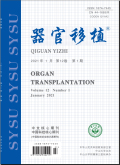器官移植2024,Vol.15Issue(4):570-574,5.DOI:10.3969/j.issn.1674-7445.2024009
HIV阳性实体器官移植受者的免疫抑制药物管理
Management of immunosuppressive drugs in HIV-positive solid organ transplant recipients
摘要
Abstract
The application of combination antiretroviral therapy(cART)has significantly prolonged the life expectancy of patients infected with human immunodeficiency virus(HIV).However,viral infection and adverse reactions of cART drugs make patients more prone to organ failure.Solid organ transplantation has become a standard treatment for HIV-infected patients with end-stage organ failure.Nevertheless,among HIV-positive soild organ transplant recipients,multiple problems remain to be resolved,such as increased incidence of graft rejection,increased infection risk,drug toxicity and drug interaction between cART therapy and immunosuppressive drugs,etc.It is extremely challenging to deliver appropriate management for HIV-positive soild organ transplant recipients.Therefore,the application of immune induction therapy,calcineurin inhibitors,mammalian target of rapamycin(mTOR)inhibitors and other immunosuppressive drugs in HIV-positive soild organ transplant recipients was reviewed,aiming to provide reference for subsequent management of immunosuppression in HIV-positive soild organ transplant recipients.关键词
人类免疫缺陷病毒/实体器官移植/联合抗逆转录病毒治疗/免疫诱导/钙调磷酸酶抑制剂/哺乳动物雷帕霉素靶蛋白抑制剂/霉酚酸/糖皮质激素Key words
Human immunodeficiency virus/Solid organ transplantation/Combination antiretroviral therapy/Immune induction/Calcineurin inhibitor/Mammalian target of rapamycin inhibitor/Mycophenolic acid/Glucocorticoid分类
医药卫生引用本文复制引用
邵琨,王祥慧,周佩军..HIV阳性实体器官移植受者的免疫抑制药物管理[J].器官移植,2024,15(4):570-574,5.基金项目
海南省卫生健康行业科研项目(22A200345) (22A200345)

